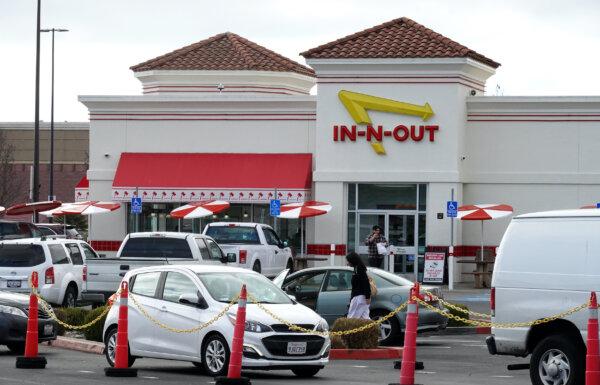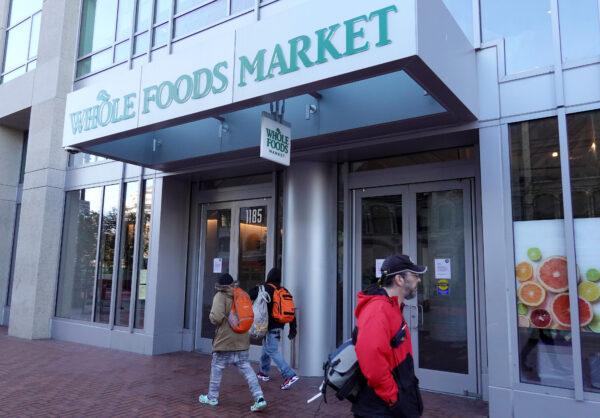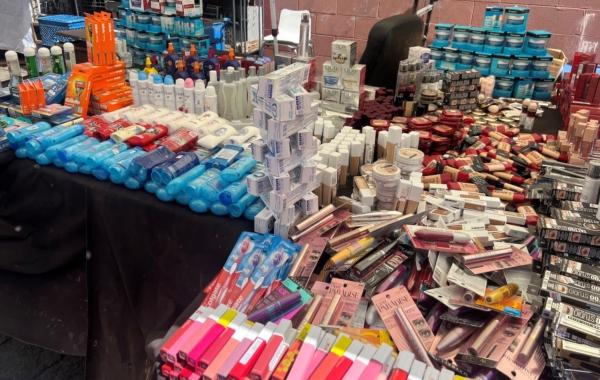Repeated thefts became the final straw for a hardware store in San Francisco, prompting it to bolster security measures after more than 120 years in business.
Shoppers at the store, located in the Cow Hollow District, an affluent neighborhood situated in the northern part of the city, will first be greeted by a table blocking the entrance with signs that read, “Please wait for assistance.” After that, employees must accompany shoppers throughout their visit.
“We really weren’t given a choice. We have to keep our employees safe and our customers safe,” Fredericksen Hardware & Paint store manager Sam Black told local station Fox2. “When they’re coming in to do snatch and grabs, that was the final, final straw.”
The “one-on-one shopping experience” was implemented a few weeks ago, in addition to various other safety measures, including installing more security cameras, drilling pots and pans onto display walls, and locking up some items, as reported by The San Francisco Standard.
While such practices may appear uncommon, experts suggest that implementing such measures, specifically to control shopper flow, isn’t unprecedented.
Rachel Michelin, president of the California Retailers Association, said in a recent interview with EpochTV’s “California Insider” that other stores in San Francisco have made similar efforts.
“Some of the luxury brands, particularly around Union Square, have been doing this for a while,” she said, regarding the store’s new policy. “We saw this a little bit during COVID, where you saw folks having to wait in line because of capacity limits. So, I think this is a different take on that.”
Another security expert said that while such can be effective, it may not be feasible in the long run.
“One employee per customer is an expensive way to deter crime for a store,” Frank Ma, a former law enforcement officer who now works as a security advisor in San Francisco, said during an interview with the California Globe on Feb. 23. “Many places cannot afford to do that very long, or if they can, it means other areas are suffering because of employees being sent from other jobs like stocking or being at the register.”
But the store manager said the store had no choice, based on crime now creeping into its neighborhood.
“It’s a shock. This has been happening maybe all over the city and other parts of the country. Now, it’s finally reaching Cow Hollow,” Mr. Black said.
In recent months, several high-profile companies have announced their closures around the San Francisco Bay area.
Last fall, Target closed its downtown Oakland store as a result of more than 100 smash-and-grab thefts in 2023. In-N-Out Burger’s sole Oakland location also closed in January—the first time in the company’s history—citing rampant burglaries and armed robberies. Additionally, a Denny’s, also in Oakland, shut down recently as a result of crime.
Those that have also shut down in recent years in San Francisco for the same reasons include Nordstrom, Saks Off 5th, Anthropologie, Office Depot, H&M, and more than a dozen others.

An In-N-Out Burger restaurant in Oakland, Calif., on Jan. 23, 2024. Fast food chain In-N-Out Burger closed one of its profitable restaurants in January as a result of high crime in the area, such as car break-ins and armed robbery, which is making it unsafe for customers and workers. (Justin Sullivan/Getty Images)
Additionally, Whole Foods Market shuttered its store at 8th and Market streets because of safety concerns, just a year after its opening.
Los Angeles is also experiencing an increase in retail crime, with the Los Angeles Police Department reporting an 81 percent rise in shoplifting in 2023 from the previous year.
Ms. Michelin, the retail association president, echoed the store manager’s concerns, saying crime is now affecting far more individuals.
“A few years ago, the hotspots were San Francisco and Los Angeles,” she said during the California Insider interview. “But now I think we’re seeing this across the state in every community. You’re seeing that regardless of what type of community you live in, people see retail [theft] that’s happening on a daily basis.”

Pedestrians walk by a closed Whole Foods Market store in San Francisco on April 12, 2023. (Justin Sullivan/Getty Images)
According to Ms. Michelin, one of the biggest challenges faced by retailers is the lack of prosecution of repeat offenders. Additionally, she said organized retail mobs have been taking advantage of the $950 threshold for felony charges, a provision established by the passage of California’s Proposition 47 in 2014.
However, she remains optimistic about the future of the state, saying that many lawmakers have acknowledged the situation and are actively advocating for legislative changes.
“As we start looking at [bills currently under consideration in the Legislature] as a whole, I think it really is going to be a game changer for retail theft in California,” she said.
A new bill, Assembly Bill 2943, introduced this month, aims to combat organized criminal activity by imposing stronger penalties on repeat offenders and individuals profiting from such crimes.
“Criminal enterprises are using new and different ways to get around current prohibitions, and that’s not acceptable to me, it’s not acceptable to the public, and ... it is our responsibility to ensure that our laws are addressing the situation at hand,” state Assembly Speaker Robert Rivas, co-author of the legislation, said during a press conference announcing the bill in February.

CVS Pharmacy items among nearly 14,000 products recovered from retail theft ring investigation are stacked together in Glendale, Calif., on Aug. 31, 2023. (Courtesy of California Highway Patrol)
A proposed ballot initiative is also aiming to reform Prop 47. Dubbed the Homelessness, Drug Addiction, and Theft Reduction Act, the measure would elevate penalties for repeat offenders of theft and certain drug crimes.
Shoppers can also help by buying from legitimate sellers, Ms. Michelin said.
“When you see someone selling something on the street or ... you see something that’s a really great deal. ... Well guess what? It’s probably stolen,” she said. “Consumers need to be mindful of when they shop to make sure they’re shopping from verified online vendors.”
Travis Gillmore contributed to this report.













